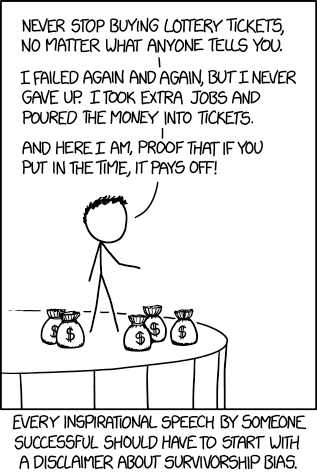Pro recruitment tip: ask your mum!
By Guillaume Filion, filed under
recruitment,
leadership.
• 09 July 2018 •
The key of success is to choose the right people for your team. That’s what everybody will tell you. But if you ask “how?”, things will get a little more complicated. Practitioners admit that this is a tough problem, and you cannot expect to win all the time. Google attempted to answer the question with the so-called Project Aristotle. After sifting a huge amount of data through the best algorithms, they concluded that you can ignore gender, age, culture, education and pretty much everything else... What makes a good team is not good people, it is good interactions.
 This is great news, but it does not really answer the question of how to choose the right people for your team. How does one know that a candidate will nicely interact with the team? Those were the questions I had in mind when I had to assemble my scientific team. Like almost everyone, I did not have any kind of training in this regard and I was not really prepared. So I sought advice from everybody who would care to give me their opinion, may they be colleagues, friends or family members. In the process, I did not really learn how to choose the right people for my team, but I definitely learned who I should listen to. Here is my purely subjective ranking, from worst to best.
This is great news, but it does not really answer the question of how to choose the right people for your team. How does one know that a candidate will nicely interact with the team? Those were the questions I had in mind when I had to assemble my scientific team. Like almost everyone, I did not have any kind of training in this regard and I was not really prepared. So I sought advice from everybody who would care to give me their opinion, may they be colleagues, friends or family members. In the process, I did not really learn how to choose the right people for my team, but I definitely learned who I should listen to. Here is my purely subjective ranking, from worst to best.
Number 5: myself
The great loser of this competition is myself. Over the years, I noticed that my own judgement of the candidates is very inconsistent. I can become very excited when reading the motivation letter of a candidate and get a cold shower when reading his or her CV. Or I can find that a candidate is very suitable for the team, but upon reading the application again the next day, I can wonder what I found so interesting the first time. Overall, my own judgement tells me little about the value of a candidate, if only because it keeps changing.
Many experienced researchers say that you have to go by your instinct and that gut feeling is the best way to choose. The argument is that your unconscious mind is much better at taking complex decisions than your rational mind. This is certainly the case, but there is also plenty of evidence that the human mind – unconscious or rational – is just not very good for hiring decisions. For what I know, the “gut feeling” narrative may be a self-serving confirmation bias where people remember the cases they were right more easily than the cases they were wrong.
Number 4: my mentors
 I have great mentors who always had only the best intentions. But there are many reasons why your mentors may give you some bad advice – Robert Sutton, a popular writer on leadership, gives some of them in a brief online article. The key is that your mentor and you are different, and chances are that they just tell you what worked for them. For instance, your definition of success may be different from your mentor’s, or you may have more specific information than they do.
I have great mentors who always had only the best intentions. But there are many reasons why your mentors may give you some bad advice – Robert Sutton, a popular writer on leadership, gives some of them in a brief online article. The key is that your mentor and you are different, and chances are that they just tell you what worked for them. For instance, your definition of success may be different from your mentor’s, or you may have more specific information than they do.
More generally, I have learned to ignore advice that comes at no cost. Your senior colleagues are probably more skilful than yourself, but are they committed? We tend to regard distance as a positive thing when it comes to giving advice because an external advisor is more likely to be unbiased. But is this really the best criterion? After all, flipping a coin is also unbiased. I found that the commitment of my mentors to my case is a much better indicator of how much I should trust them than how successful they are.
Number 3: my peers
Next on the list are my younger colleagues, going through issues that were similar to mine. I have learned a lot from mutual coaching or simply talking about the problems we faced, and I have usually taken better decisions based on these discussions than based on external advice. The effort of talking about a situation and understanding how you feel about it is not wasted. This can help you get to solutions you are more likely to act on, simply because they come from yourself.
Number 2: my team
 One should always think how a recruitment will affect the group dynamics. The group members themselves are often the most reliable source of information in this regard. They have no reason to hide their impression of a candidate, and it is their interest to work with colleagues they like. On the other hand, they admitted being unable to judge the skills of candidates, so I would not rely on them to evaluate a CV for instance.
One should always think how a recruitment will affect the group dynamics. The group members themselves are often the most reliable source of information in this regard. They have no reason to hide their impression of a candidate, and it is their interest to work with colleagues they like. On the other hand, they admitted being unable to judge the skills of candidates, so I would not rely on them to evaluate a CV for instance.
Many group leaders I meet in congresses boast about the fact that they ask the opinion of their team members before recruiting someone – implying that few of their colleagues do. They probably refer to their discovery that the best candidates are not always those with the best publication metrics. An important discovery indeed.
Number 1: my relatives
One of the biggest surprises was to realize how lucid my relatives are regarding recruitment. Whenever they have met the candidates, their comments had some uncanny accuracy – even though they are not researchers. Maybe this was just luck, but I think something else is going on here. Interactions are the key of performance, and those involving the boss are essential. For instance, many people leave the academia because of a dysfunctional relationship with their boss. A good match between the candidate and the boss is already a giant step towards a great work environment.
Great interactions make great teams. And of course, your relatives know everything there is to know when it comes to relationships with you. They probably know much better than yourself the type of person that you would enjoy working with (or that you could tolerate). And if not better than yourself, definitely better than your colleagues. But they have an even more exceptional advantage over your colleagues: they care about you. If you make a bad hire, your colleagues will merely feel sorry; your relatives will lose nearly as much as you.
Epilogue
This is a subjective interpretation based on personal experience. You should of course take my advice with a pinch of salt – plus I just advised you to distrust people who do not know you so well. Truth be told, I am not relying so much on my relatives for recruitment these days, but I have learned from them much more than I expected. Family and friends are a blessing, in many ways.
« Previous Post | Next Post »
blog comments powered by Disqus

